MURFREESBORO, Tenn. — Following a short cartoon-themed introduction outlining his life story and credentials played on a large flatscreen panel for the awaiting audience, Adolph “Doc” Brown III kept the crowd a bit in suspense as he decided the timing of his entrance.
With a U.S. flag-themed backpack in tow, he ascended the stage inside the Stones River Country Club to the soul classic “I’m Coming Out” — dressed in an oversized white T-shirt, camouflaged pants and headband wrapping the numerous skinny plaits spread across his head in practically all directions. This wasn’t your normal keynote.
With a mixture of humor, music, deeply personal anecdotes and audience participation, Brown brought a unique energy and perspective to this year’s Middle Tennessee State University Leadership Summit hosted by the Jennings A. Jones College of Business.
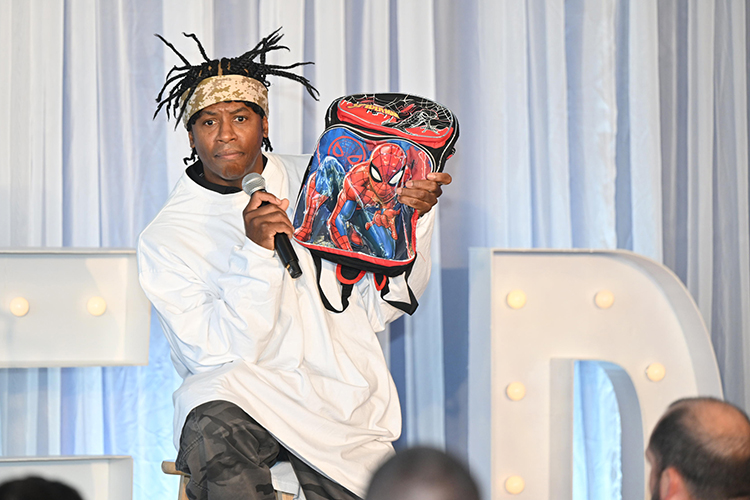
As a professor who considers his appearances “a master class” not a keynote, Brown told his audience there were only three prerequisites for his session titled “Intentional Leadership: Creating a Healthy Work Environment”: have a sense of humor; have a sense of empathy; and have a degree in common sense.
“I knew I was in the right place today, folks, because no one called the police, thank you so much,” he riffed to a round of laughter. “This isn’t exactly ‘country club attire.’ … But this is what I looked like in elementary school, folks. We have to remember that the tree is in the seed, and we have to do a better job of not killing the seeds before they have an opportunity to grow.”
Like many MTSU students, Brown was a first-generation college student, the first among five siblings to even graduate high school. Now an internationally known educator, author and speaker, he discussed the importance of influential mentors who guided him early on in his career as a young faculty member and helped him develop “championship habits,” the title of the book shared with attendees following the event.
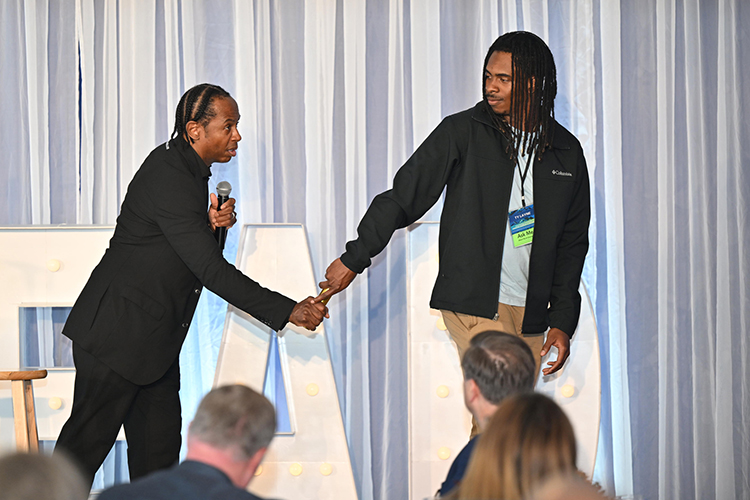
But Brown also shared the challenges of his parents’ early divorce and growing up in a single-parent home in the inner city; the tragedy of his older brother being murdered when Brown was only 11; life lessons and work ethic absorbed on his grandparents’ farm; losing his dad to COVID-19; the emotion of supporting his wife as she successfully battled breast cancer … those many things that we carry in life’s backpack, a theme the father of eight carried throughout his hourlong talk.
“Everybody’s carrying something you know nothing about,” he said. “… So stop taking everything so personally. The moment you take something from someone personally, you put it in your backpack with all the other stuff you already have.
“… If we don’t empty our backpacks, folks, of the stuff that we’re carrying from our past, whatever’s on our plates gets served to our students, our colleagues, our peers, our families, to those we love. If we don’t empty our backpacks of our past, this constantly will allow your personal storm to get others wet.”
But Brown said he was most concerned with “the second backpack” we carry — the one that carries the things that we hide or that no one else knows about. Brown said leaders must learn to “put people before profits” and that “the best leaders are reflective leaders.”
“We’re only as sick as our secrets. Did you hear that? It doesn’t mean we have to go out and blab what we’re carrying, but it does mean you have to know what you’re carrying, otherwise it’s going to come out and hurt you and many great relationships.”
“… The two most humbling things a human being can ever do is self-reflection and self-correction.”
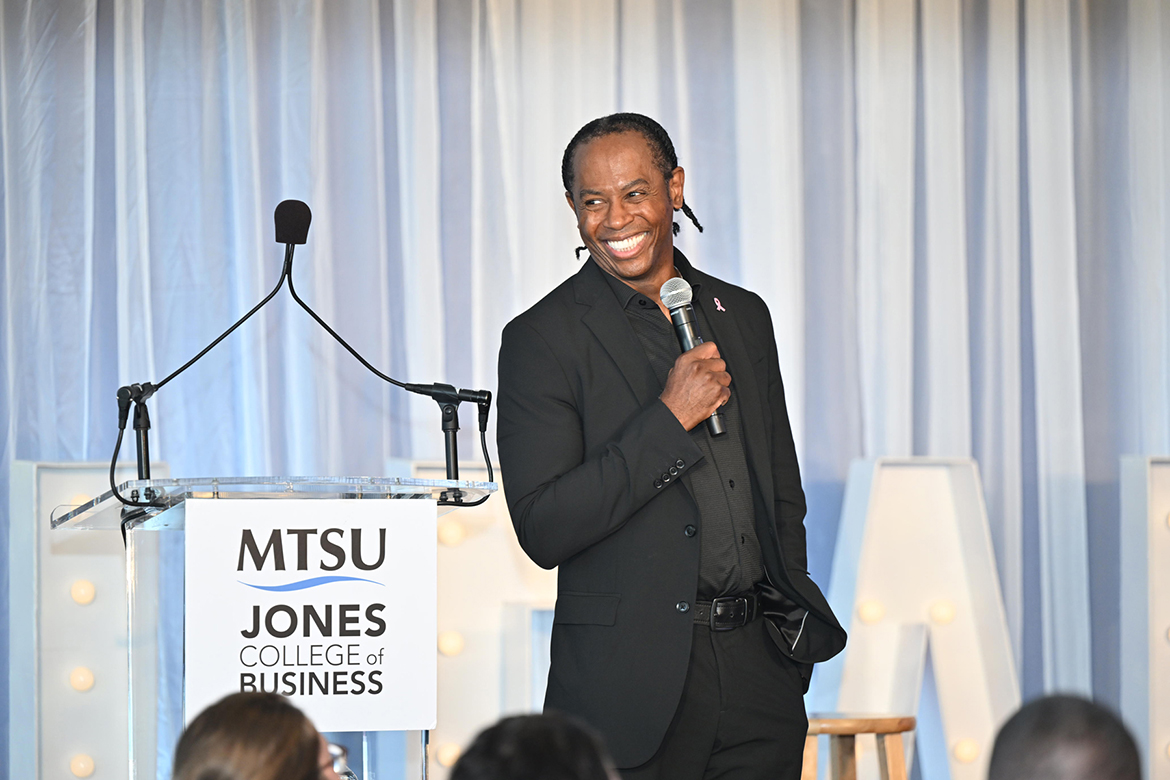
Encouraging the audience to try to empty their backpacks daily, Brown ended his presentation by disrobing from his oversized clothing and what turned out to be a wig to reveal a black business suit and well-coifed set of cornrows before eventually donning the academic regalia of Dr. Adolph “Doc” Brown, with Michael Jackson’s “Man in the Mirror” providing the musical backdrop. He went on to answer a number of questions during an audience Q&A.
Brown’s messages resonated with MTSU business administration major Will LeFevre of Jackson and classmate Daniel Anger, a business management major from Brentwood.

They were among students who had posterboard projects on display at the summit as part of professor Leigh Anne Clark’s management class. Their team won the “fan’s choice” award for their project on an artificial intelligence marketing tool, with the duo later realizing it was the partially disguised Brown who engaged them and other students about their displays prior to his presentation.
“I went up and shook (Brown’s) hand afterward and told him it felt like he’s been watching me all week,” LeFevre said. “It’s like I needed to hear that … letting things go and not holding grudges. It felt like a grudge I needed to keep, but hearing him speak, it’s almost like it disintegrated. I’m taking it out of my bag.”

Anger gleaned similar insights from Brown’s challenging presentation for those looking to be leaders in their fields and in their workspaces.
“I loved that he talked about not taking things personally and about going through a lot of experiences and realizing that they don’t define you,” Anger said, “and how if you’re holding onto a lot of stuff, it’s not good and it can affect a lot of the people around you. Like he said, your storm can get a lot of people wet. So it’s about getting out of yourself and getting rid of a lot of things on you because it’s not about you. Have forgiveness.”
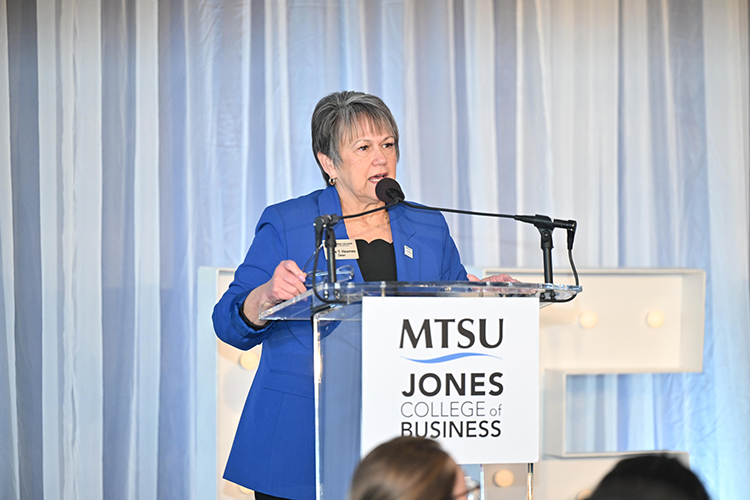
In welcoming the capacity crowd made up of students, faculty, staff and community members, Jones College Dean Joyce Heames reminded the audience of the summit’s purpose to “explore the traits of successful, innovative leaders and entrepreneurs.”
Heames also acknowledged the Jones College Awards recipients who were recognized the previous evening with a special reception and awards presentation ceremony at the country club.
This year’s award winners included:
• Recipient of the Young Professional of the Year Award is Derria Ford, chief advancement officer at the Martha O’Bryan Center, a Nashville anti-poverty organization. The award honors an individual who has excelled at a young age, serving as a role model and inspiration to others while showing the potential for even greater achievements.
• Recipient of the Jones College Exemplar Award is Tosha Price, a strategic partnership specialist at Ascend Federal Credit Union with over nine years of managing financial education partnerships. The award is presented to a Jones College graduate whose personal and professional behavior inspires alumni and current students at Jones College.
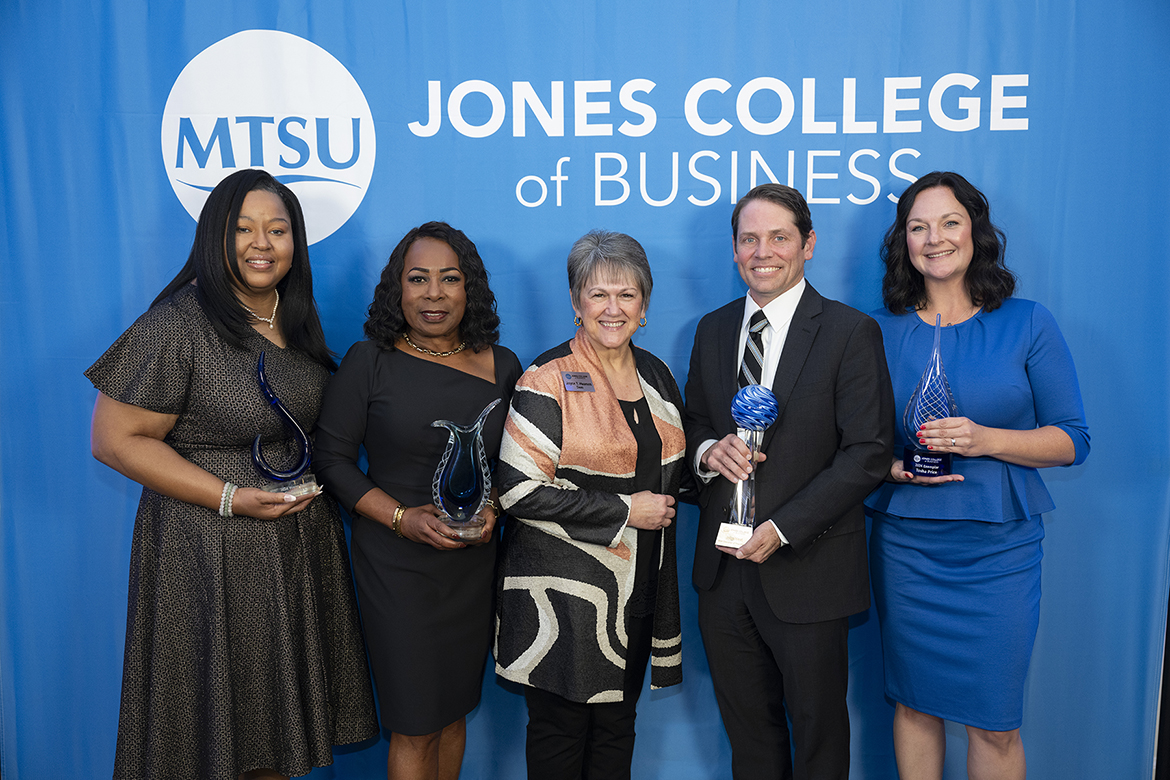
• Recipient of the Joe M. Rodgers Spirit of America Award is Victoria Eady Butler, the master blender at Uncle Nearest Inc., the fastest-growing whiskey brand in U.S. history. As the great-great-granddaughter of Nearest Green, the first known African American master distiller, she proudly carries on her family’s legacy. The award commemorates Ambassador Joe M. Rodgers’ extraordinary accomplishments in business, government, education, and charitable endeavors. It is presented to an accomplished businessperson who has demonstrated the spirit of America in one or more of the following areas: government, charitable organizations, civic organization, or education.
• Recipient of the Jennings A. Jones Champion of Free Enterprise Award is John West, the managing partner with Deloitte Nashville, leading 750 client service professionals. The award is presented to an individual whose achievements align with the highest traditions of the American free enterprise system. Award recipients are role models whose business, professional, and personal achievements stand out for all to see and emulate.
— Jimmy Hart (Jimmy.Hart@mtsu.edu)
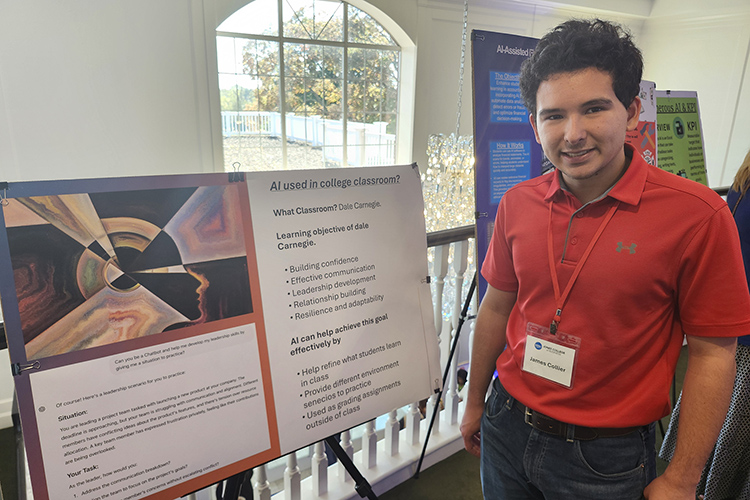
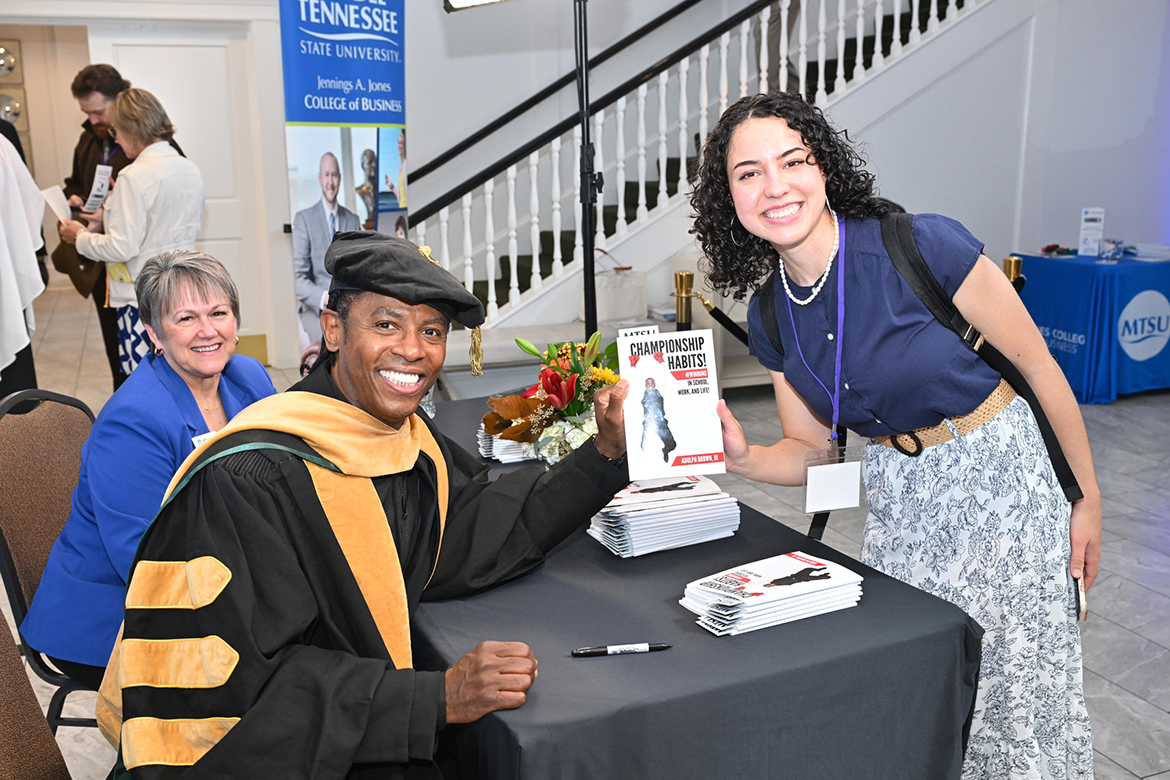

COMMENTS ARE OFF THIS POST